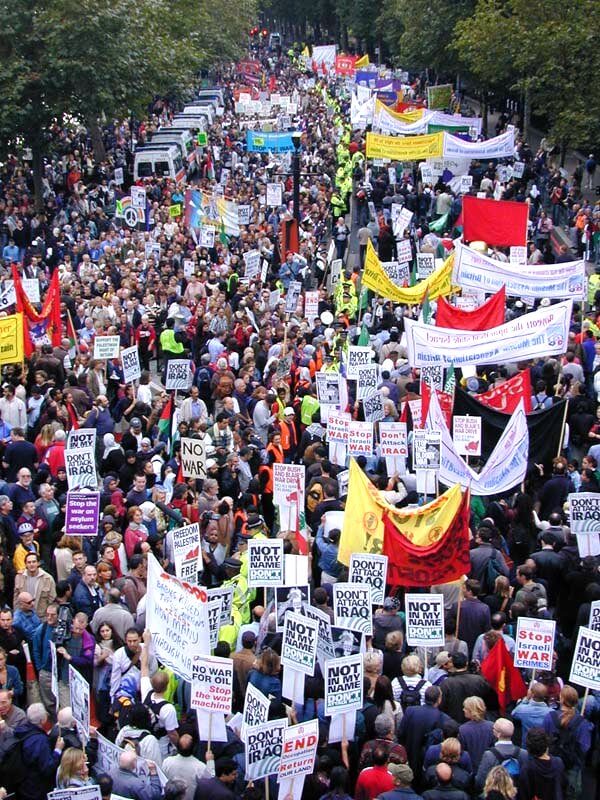This year is the 20th anniversary of the global demonstrations against the Iraq war. To this day, those protests remain the largest mobilisations in human history, with an estimated 14 million people, in 600 cities around the world, coming together for an orchestrated Global Day of Action on 15 February 2003 to try and stop Bush and Blair’s drive to go to war in Iraq.
It was an electrifying moment in British political history. Talk of the war dominated all aspects of cultural and political life – in schools and places of worship, workplaces and universities, music and film festivals, as well as in the media. There were meetings every week, up and down the country, with local anti-war groups springing up organically. Almost every day, a major celebrity spoke out against the war or tried to use their platform to influence opinion.
The actual day of 15 February was a triumph, with people of all ages and backgrounds coming together on the streets of London. As I stood in Hyde Park and listened to speeches from Tony Benn, Rev Jesse Jackson and the actor Tim Robbins, I hugged friends and felt overwhelmed by the extraordinary sea of people who had come together to save lives.
But a month after the demonstrations, on 19 March 2003, the US sent its military forces into Iraq. It was the start of an occupation that would last nearly 10 years, lead to hundreds of thousands of deaths and reshape the Middle East. Like many, I was crushed in the months that followed. Many people never went on a demonstration again and it led to huge numbers of people disengaging from politics for years. But looking back from the vantage point of where we are now, it’s clear the anti-war movement changed history.
A whole generation of people were introduced to activism through that movement.
A whole generation of people were introduced to activism through that movement, as well as big ideas such as how the fossil fuel industry fuels the war machine. The anti-war movement set the political agenda on military interventions and trust in politicians for decades to come, and influenced the rise of politicians from Jeremy Corbyn in the UK, to Bernie Sanders in the US, to Brazil’s current president Lula – who led the Sao Paulo protests.
For those fighting the climate crisis today, the lessons from the anti-war movement are manifold. What made it so impactful was its pluralism. To this day, I’ve never seen a social movement as diverse in terms of age, ethnicity and social class, and it achieved this by intersectional organising.
We didn’t just talk about the war but also about neo-liberalism, the arms trade, the fossil fuel industry, Islamophobia, imperialism and racism. The movements were also decentralised, with local groups organising events in a way that spoke to their community, and we spent hours debating and discussing with others. This is something we perhaps have lost; the ability to sit down with people we disagree with, debate with them and, over time, and bring them over to our point of view. Instead of kneejerk cancel culture, a lesson from the Iraq anti-war movement is that we should offer people our empathy and our time if we want to bring them along with us.
This column was initially published in the spring-summer edition of Wicked Leeks magazine. You can order a hard copy of the magazine until 17 May, or read the digital edition online for free.










0 Comments